
CZECH REPUBLIC
Since the Ukrainian crisis, around 40 websites and other channels (Facebook and YouTube) have been engaged in disinformation campaigns in the Czech Republic.
The most prominent subject on Czech disinformation channels were issues connected with refugees from Arabic countries and the danger of Islamization of Europe. Specific subjects were cases of violent crimes committed by migrants in European cities, radical Islamism and terrorist attacks. The migration crisis is often portrayed as a planned conspiracy of globalist elite or as a demonstration of inability of European politicians to find an effective solution. The xenophobic news reports concerning other ethnicities (such as reports about violence of Gypsies youngsters or thoughts about Jewish worldwide conspiracy) were minor but also present.
Read: Are there "independent" media in Russia and why would Putin need them?
Another popular subject was criticism of Western political elite that had two patterns. The USA was described as aggressive and war-like country which endangers world peace. The EU elite was described as weak, naïve and biased due to their political ideology.
Among other popular narratives was crisis in Ukraine. The country was being regularly illustrated as “collapsing and ruled by incompetent government that terrorises its own population”. Positive narratives about Russia were presented rather occasionally. The conspiracy websites and YouTube channels portrayed Russia as the main opponent of the aggressive USA that projects a certain degree of stability. The alternative media sought to mention Russia in connection with other than political issues – e.g. successes of its scientists or sportsmen. When it comes to the political elite (mainly President Vladimir Putin) they were presented as skillful statesmen.
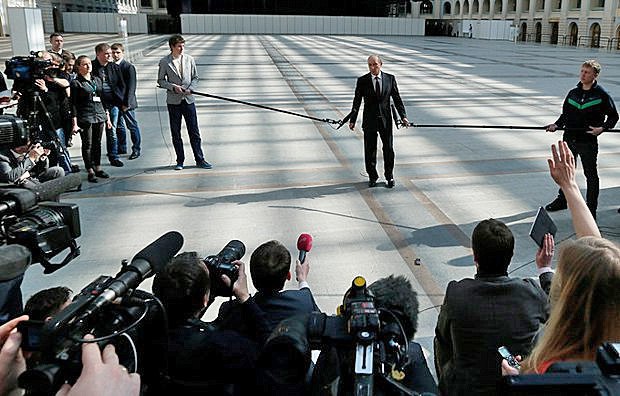
The pool of articles showing Russia as a victim of Western aggression was often presented. For the Facebook pages Russian President Vladimir Putin was one of few politicians mentioned in positive connotations.
HUNGARY
Currently, there are about 80-100 websites in Hungary spreading the narratives of the Kremlin. However, the decisive majority of them do not seem to have a serious impact, at least it cannot be verified from the number of shares and likes on Facebook, and they remain on the blog sphere.
Hungary is characterised by a specific phenomenon regarding the channels of Kremlin disinformation narrative, namely that pro-Kremlin disinformation often appears in the mainstream media too, primarily in channels and newspapers that are either state-owned or influenced by the government. This is an important difference between Hungary and the other Visegrad countries.
Out of mainstream media channels, where pro-Kremlin narrative is often spread, clearly the state news agency MTI is the most important, particularly because it provides news for free, thus is extremely influential throughout Hungary.
One needs to add though, that in terms of content, MTI does not publish fake or fabricated news. However, it indeed gives room to such Russian opinions, either of leading politicians or of influential newspapers, which serve as channels of disinformation on multiple levels. This ranges from labelling separatists in Eastern Ukraine as if they were a legitimate state to blaming the United States for the en masse death of civilians in Syria.

Besides, all major dailies contain articles that may qualify as parts of pro-Kremlin disinformation.
There are numerous authors in the staff of one of the two right-wing dailies (pro-government, almost far-right) who regularly publish pieces of outright disinformation and anti-NATO, anti-EU propaganda. The background of the journalists is well-known, and many of them have close connections to Russia and Russian ideologies and the whole editorial staff share the same, clear political preferences.
In the other conservative, independent daily, often critical towards the government, there are a few journalists, well known of their pro-Russian sentiments. Their leading foreign policy journalist can be characterised as Russlandversteher – and a really wellinformed expert on Russia – for ages, well before Moscow has started its coordinated disinformation operations. His publications constitute the perfect example of how hard it is to distinguish between honest convictions and intentional disinformation operations. His publications contribute to the presence of the pro-Kremlin narrative in the Hungarian mainstream press discourse.
It should be noted that several chain mails among the elderly population – a significant tool, as three million retired people live in the country – are also spreading pro-Kremlin propaganda. It is difficult to measure and to reach out to these channels, however their efficiency is much higher than any news portal: the sender knows the receiver and therefore the latter trusts the information more, even if it is just a copypaste version of a pro-Kremlin article.
In terms of content, the research concluded that pro-Kremlin disinformation against Hungary produced surprisingly little content, tailored specifically to the Hungarian audience. This is an important difference if compared to Poland. It can be assumed that pro-Kremlin disinformers missed the opportunity to play on the anti-Romanian, anti-Slovak, nationalist-revisionist attitudes present in certain layers of the Hungarian society
The only exception was the active spreading of anti-migration content, in which pro-Kremlin disinformation channels actively participated, together with the Hungarian government-controlled media. However, in this particular case Russia’s interests and Hungarian government’s interests overlapped, because both have been interested in weakening the EU by hampering the elaboration of a common EU-level solution.
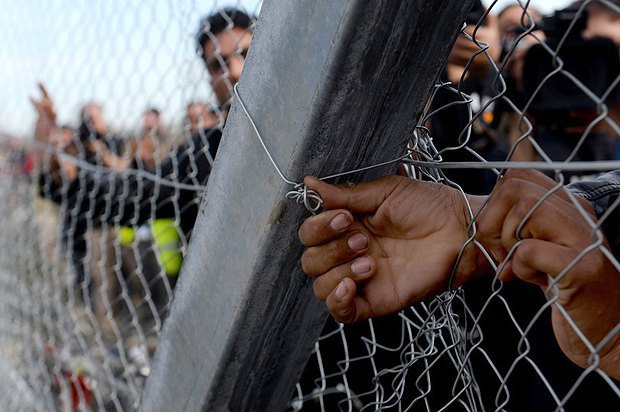
The reason of this relative absence of Hungary-specific pieces is not known. One possible (though unlikely) explanation might be that they are simply unaware of these possibilities. The second variant is that strategic and operational planners of pro-Kremlin disinformation consider the Hungarian population an already friendly, convinced one, therefore there is no need to conduct a serious information campaign. Another possible explanation might be the sheer shortage of resources: for running information operations against Hungary one needs to employ Hungarians (i.e. it’s not that same as commenting and trolling in English, which can be done at a sufficient level by anyone, who speaks the language at a medium level).
And the third possible reason is that the Kremlin views EU member Hungary not as an object of influence (either because of the country’s small size or, as was said above, because of Hungarians’ loyalty) but as a platform for spreading Russian disinformation further into Europe.
This is confirmed by pro-Kremlin disinformation efforts focused on spreading generalised, and not specifically Hungary-focused content. The main strategic aims of the spread narratives were to erode trust in EU; to foster anti-migration and anti-refugee sentiment; to generate and strengthen anti-NATO sentiment; to generate and strengthen anti-Americanism; to discredit Ukraine, by picturing it as a fascist-ruled, aggressor, corrupt, failed state; to discredit the report of the Joint Investigation Team about the downing of Malaysian Airlines MH17 flight; to discredit liberal values, human rights approach and NGOs dealing with the promotion of these values.
MOLDOVA
Russian influence in the Republic of Moldova is very powerful and is channelled through various ways, including by means of several mass-media institutions from Russian Federation which are retransmitted or broadcast in Moldova, via new media and socialising networks, plus the communication sources of some political formations and other pro-Russian interest groups.
Moldova’s biggest propaganda websites are Kp.md, webpage of the Russian newspaper "Komsomolskaya Pravda"; Sputnik.md, a branch of the international network "Russia Today" holding, which is headed by Dmitriy Kiselev; Ntv.md, webpage of NTV Moldova, a branch of Russian NTV channel.
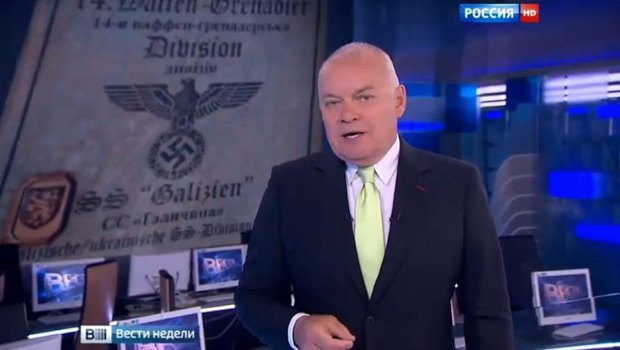
Others include Pan.md, webpage of the Moldovan Russian-language newspaper "Panorama" (owned by Dmitrii Ciubaşenko, affiliated with the pro-Russian political party of businessman and Balti mayor Renato Usatîi. Renato Usatîi is in Moscow, and from there he is leading Balti Town Hall and his political party); Actualitati.md, web portal of the Socialist Party of Moldova (PSRM), the party of incumbent pro-Russian President Igor Dodon; and Gagauzinfo.md, web portal of the Gagauz autonomy, where there are strong pro-Russian sentiments.
Direct and indirect messages conveyed by the majority of monitored publications are deliberately pursuing the inoculation of several major ideas into the Moldovan public’s mentality/thinking and, namely: “Europe soon to dissolve”, “The USA and Europe challenge Russia that has to defend itself and protect the fair system worldwide”, “Chisinau Government is ruled from outside, being unable to decide by itself”, “NATO prepares a nuclear war against Russia, and Moldova could turn into a battlefield in this war”, “Moldova is likely to repeat Ukraine’s fate unless the country’s leadership re-orients to Russia”, “Republic of Moldova’s adherence to EU is impossible, and the Association Agreement goes against the country’s interests”.
In such a way, some of the mentioned online resources are constantly covering, on big surfaces, the opinions of certain pro-Kremlin experts, who claim that many conflicts in the post-soviet space were exclusively of American origin, and East European countries, including the Republic of Moldova, should choose between two development models: “The American model - overwhelming, totalitarian, or the Eurasian - fair, multipolar, preserving the identity and sovereignty of states”, highlighting that Moldova has a future only by Russia’s side, since “the West will not solve Moldova’s problems, but Russia will”. Usually, such subjective opinions are not grounded on any factual basis. Nevertheless, they are exposed as facts and stressed in the headlines of respective articles.
The idea that Moldova, as well as the neighbouring countries, Romania and Ukraine, is ruled from the outside by means of certain networks of graduates born by the foundations of American billionaire George Soros and who are, as a matter of fact, American influence agents and pawns piloted by American administration, is insistently propagated by pro-Russian media. It is claimed that the USA and Europeans “are buying” Moldova through grants and credits and that there would even exist a conspiracy of the West, the USA and NATO against Moldova. Thus the unique salvation for Moldova is becoming closer to Russia and integrating into the Eurasian Union.
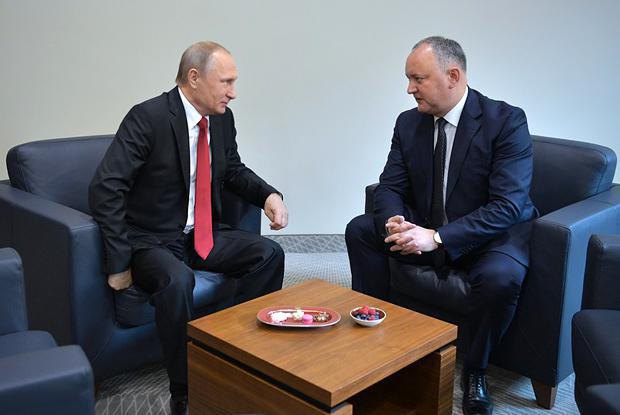
Another idea that is frequently circulated by pro-Kremlin sources is that Europe is in the middle of chaos, undergoing a rapid disintegration process, which is irreversible, that the EU is morally decaying, failing to be any longer a defender of Christianity and civilization, and conceding in front of aggressive foreigners’ invasion. By contrast, Russia is featured as a guardian of the orthodox values, investing tremendous efforts in instating a correct and democratic governance in the world. But these efforts are discredited by persons guided by the US State Department, Soros Foundation, various NATO structures, Romanian Government, which are unjustly accusing of Russia, as their western leaders dictate.
Pro-Russian online sources support and actively promote the parties and other formations/groups which are in favour of denouncing the European pathway for a greater proximity with Russian Federation. This could be especially noticed during the election campaign for presidential elections in Moldova in October-November 2016.
SLOVAKIA
There are around four channels of communication of pro-Kremlin narratives.
First, there are the websites with articles translated from the Russian websites. The Slovak case is particularly interesting, because of the similarities between the Slovak and Czech language. Therefore, many of the articles are either translated from Czech or simply published in the Czech language.
It is important to note that the proKremlin stories have limited penetration in the mainstream media. The mainstream media often reports on Russian influence and activities in the region. However, in March 2017, there was a story published about the main Slovak press agency TASR, establishing a working relationship with Sputnik, one of the pro-Kremlin press agencies. TASR withdrew from the deal after only a couple of days following the outrage from the civil society and other media organizations.
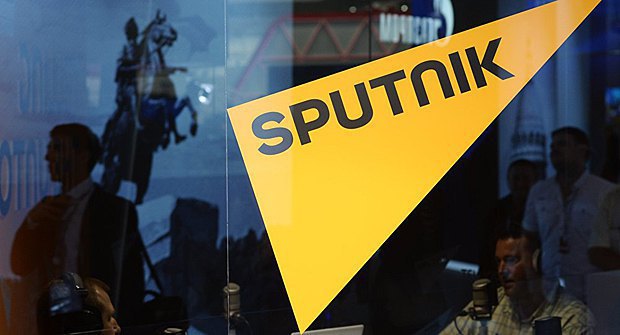
Despite this “success”, there is still a serious part of public who prefer conspiracy and alternative media over mainstream / traditional media.
Lastly, it is important to note that even several national politicians are using language that is like the one coming from the Kremlin, particularly when talking about NATO, the United States, or security situation in the region. It is still difficult to properly distinguish between those who are directly connected to the Kremlin and those who’s ideology and rooted antiAmericanism drive their actions.
The authors and articles monitored during the study mention the big conspiracy theories (i.e. Jewish conspiracy, 9/11 conspiracy theories, etc.) to a lesser extent. The big subjects included NATO-Russia relationship, completely omitting Russian domestic debate. Russian foreign policy is mostly described as good and helpful. The Russian intervention in Ukraine is described as a helping hand to the “oppressed Russian speaking minority”. The war in Syria is portrayed as a war against radical terrorism, despite being accused by many countries of assisting the regime of Bashar Assad and bombing civilian targets. The EU project and its institutions are being portrayed as declining and chaotic.
The pro-Kremlin media focus on negative news regarding the EU and the West. They do not report on success, only on protests and political scandals, such as resignations. Articles often focus on a debate about leaving the EU or even proposing alternatives to NATO membership, such as neutrality.
POLAND
The analysis of nearly 200 cases uncovered during the monitoring of over 50 websites in the framework of this project demonstrates that pro-Kremlin propaganda in Poland is extensive (many websites) and multi-channelled (mainly via articles on websites and trolling). The most prominent are five websites (apart from Sputnik and dziennik-polityczny.com): zmianynaziemi.pl; www.dzienniknarodowy.pl; alexjones.pl; wolna-polska.pl; www.pch24.pl.
Pro-Kremlin propaganda here is also unique because of some country-specific narratives and applied techniques. While Facebook plays an increasingly important role as a tool of disseminating disinformation, Twitter does not play a major role in Poland as regards main disinformation/propaganda channels.
Apart from the Russian government-owned information agency Sputnik and a dodgy news aggregator and political blog: dziennik-polityczny.com, which is probably run by Russian security services, it seems that the majority of analysed websites in Poland are home-grown.
While Sputnik serves as a reference for many websites, dziennik-polityczny.com is probably the most disinforming from all of the analysed websites, the study concludes. Researchers believe it to have the most detrimental effect on Polish society and political elite.
According to its website, its editor-in-chief is Adam Kamiński. However, as some journalist have found out, this person uses the photo of a Lithuanian orthopaedist and Wojciech Brożek, who cooperates with the portal, uses the photo of a man from New York. Articles produced by this website are often distributed by such websites like Neon24.pl or wiernipolsce1.wordpress.com. Posts with their articles are published on blogs and discussion forums written by anonymous authors (it affects all kind of media, not only right-wing but also liberal ones - like radio Tok fm).
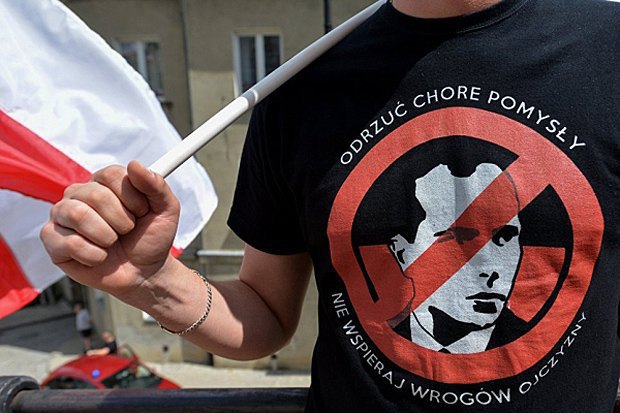
It should be stressed that using blogs (but also news sites' comments section) is the most common method used in Poland in terms of distribution of disinformation.
As regards key narratives in Poland, it seems that one of the main objectives of the pro-Kremlin propaganda is to undermine friendly relations between the societies and governments of Poland and Ukraine.
Pro-Kremlin websites in Poland publish many emotional articles, preying on fears and historical resentments. It is mainly (but not only) focused on difficult past between Poland and Ukraine (related to recalling the history of the Volhynian massacres, where Ukrainians are portrayed as wild and cruel beasts mindlessly slaughtering Poles). This typically Polish narrative is communicated with the particular aim of emotionally moving the reader. Stepan Bandera, who is, on the one hand, a creation of Soviet propaganda, on the other hand has become part of today's Ukrainian public symbol of the struggle for independence, plays a key role in the Volhynian massacres narrative. Therefore, he is a subject of constant attacks. “Banderowcy” (Bandera supporters), “UPAina” and “Nazis” are words which are quite often used in anti-Ukrainian articles and commentaries below articles.
Regarding anti-Ukrainian narrative, it is increasingly focused on present issues related to: devastations of cemeteries, monuments or schools both in Poland and Ukraine and Ukraine migrants in Poland. Those incidents which are taking place (probably inspired by a third party), are then used for propaganda purposes.
It should be mentioned here that trolling in social media and in commentaries under articles is inextricably linked to Russia’s information war toolbox. Russian trolls are very active in Poland. They very often put their comments below articles published on the three biggest and most popular information portals: Wp.pl, Onet.pl and Interia.pl. Their interest is focused upon such topics as NATO, Ukraine, the European Union and Russia. Although sometimes it is difficult to distinguish whether a given commentary is actually an act of Russian trolling, there are some hints leading to such a conclusion, namely, the lack of Polish characters (such as “ł”, “ó”, “ż”) and the use of the same argumentation as in numerous proKremlin articles.
The second key narrative in Poland, used to disinform/misinform or manipulate public opinion, is related to NATO. A particular method of disinformation was used: fake interviews with top Polish generals who were expressing unfavourable opinions about American allies, as well as about the NATO summit. The purpose of the articles was to undermine the confidence of Poles towards NATO and to impose upon the Polish public opinion the anti-NATO point of view.
However, the effectiveness of such pro-Kremlin propaganda is questionable. According to recent polls, 82% of Poles support NATO membership while 59% believe that Poland can be confident that it will receive support from its partners in the event of a military threat, Only 28% of Poles are skeptical about this.
Read: How the world should react to Russia's terrorist-destructive efforts
Another narrative, quite often used in Poland, in accusing Polish authorities of being Russophobic. It seems to grow in importance in Poland because it is universal - it may be applied by pro-Kremlin propaganda in almost every case to discredit Polish authorities or political elites: it justifies all criticism of the policy implemented by the Kremlin. It also serves a specific goal: isolating Poland from the Western allies and portraying its political leaders as emotional, irresponsible and Russophobic.

Poles also faced the problem of hacking in conjunction with the information war. In January 2017, around 100 municipal websites were hacked to display a call on local communities to protest against American troops on Polish soil.
Manipulation techniques
Manipulation techniques used by pro-Russian channels in all of the mentioned countries are varied but typical. Clandestine news websites, Facebook pages and YouTube channels publish conspiracy theories (supported by the emotional style of presentation), clearly fabricated or distorted publications, images taken out of context, statements of dubious origin and (or) of unidentified authorship. Articles contain generalizations or jump to conclusions about specific events based on individual examples, fuzzy or unverifiable data about the source. Or they carry opinions of previously unknown "experts" presented as reputable ones to give more weight to articles. Articles are sometimes based on one-sided interpretation, an uncritical view of the events favourable to one side.
On the other hand, the media adapt seemingly objective news to manipulate the target audience. However, the general manipulation technique remains the same for all the analysed channels. That is they aim at the negative emotions of the target audience.
When it comes to disinformation channels in social networks, the authors of the study concluded that influential pro-Russian pages tend to conceal their ideological positions and present themselves as alternative news channels. Only after analysing the content of these pages it became clear that the vast majority of these pages report foreign news exclusively from the point of view favourable to Russia.
To sum it up, it should be noted that since 1989, all Russian proposals starting with Gorbachev’s “Common European Home” and ending with Medvedev’s “New European Security Architecture” have had the same objectives: to abolish or at least to weaken the inner cohesion of the existing Transatlantic and European Institutions (such as NATO and the EU), as well as the presence and influence of the US in Europe. These often country-tailored measures (that accompany Russia’s aggressive activities in the region), go hand-in-hand with the disinformation campaign striving at fragmenting and shaking European unity and undermining Transatlantic relations, jeopardise European security and need to be exposed.








